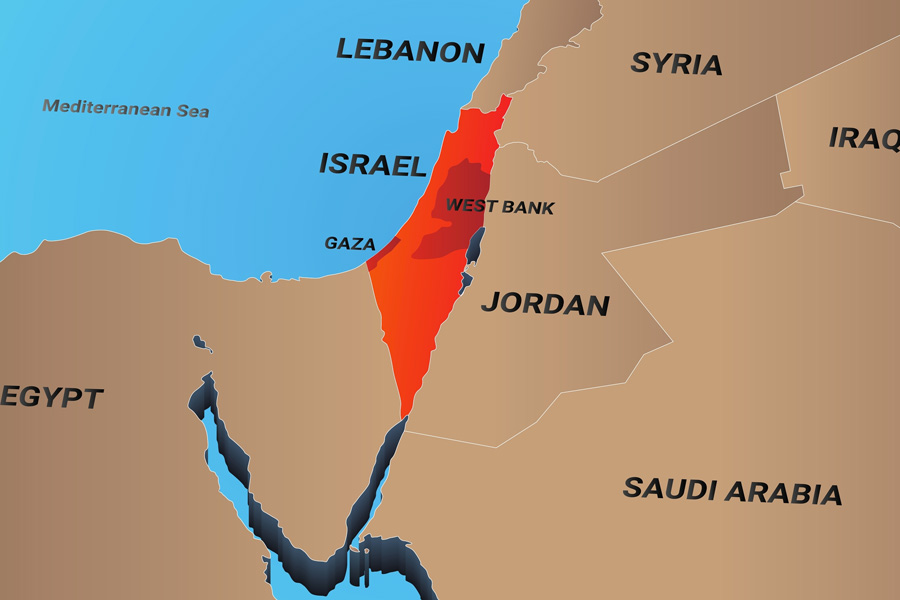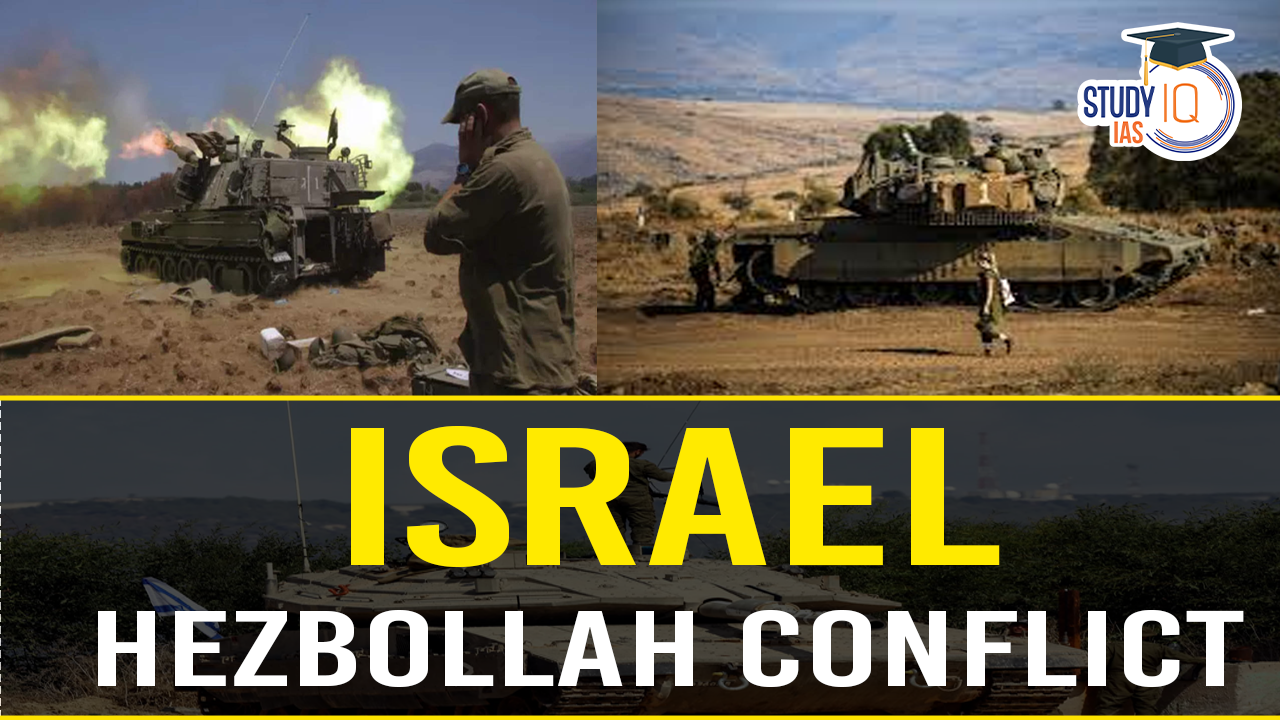Table of Contents
The ceasefire between Israel and Lebanon marks a significant step toward de-escalating tensions in a volatile region. India’s welcome of this development reflects its commitment to peace and stability in West Asia, aligning with its diplomatic ethos of dialogue and restraint.
India Welcomes End of Israel-Lebanon War
The Israel-Lebanon ceasefire is a significant step toward de-escalating regional tensions, and India has welcomed it as a move toward peace and stability in West Asia. While it offers hope for dialogue and relief for civilians, the truce remains fragile due to deep-rooted hostilities, proxy conflicts, and broader geopolitical tensions.
India’s call for restraint, diplomacy, and adherence to humanitarian law underscores its commitment to regional stability, aligning with its strategic interests in the area. The ceasefire is a positive development, but lasting peace depends on resolving underlying disputes and preventing potential escalations.
Hezbollah Chief Hassan Nasrallah Reportedly Killed in Israeli Airstrikes
Israeli military claims that Hezbollah leader Hassan Nasrallah was killed in airstrikes on September 27, 2024, targeting the group’s headquarters in Dahiyeh, Beirut. The Israeli Defense Forces (IDF) stated that Nasrallah was responsible for advancing terrorist activities against Israel. The airstrike resulted in at least six fatalities and 91 injuries, with significant damage to multiple buildings. While Hezbollah has not confirmed Nasrallah’s death, contact with him reportedly ceased following the attack. His potential death poses a significant challenge for Hezbollah’s leadership and could escalate tensions between Israel and Iran, Hezbollah’s key ally.
Over 560 Dead as Israel Bombs Lebanon; Hezbollah Chief Killed
Israeli airstrikes on Lebanon have claimed over 560 lives, including Hezbollah commander Ibrahim Muhammad Qabisi. The strikes targeted Hezbollah positions, prompting the group to retaliate with around 90 rockets fired at Israeli military bases. The escalating violence has alarmed the international community, with world leaders urging restraint and calling for diplomatic solutions to prevent a larger conflict. The United Nations has warned of a growing humanitarian crisis, emphasizing the urgent need for assistance as the death toll rises and tens of thousands are displaced. The situation remains critical as tensions continue to escalate.
Hezbollah Walkie-Talkies and Radios Explode After Pagers
- Hezbollah Devices Explode: Walkie-talkies and radios used by Hezbollah exploded, killing 20 and injuring 450, following pager explosions.
- Israel’s Alleged Role: Israel’s Mossad is accused of planting explosives in the devices, marking a major security breach for Hezbollah.
- Hezbollah’s Communication: The group relied on low-tech devices to evade Israeli surveillance, which are now compromised.
- New Phase in Conflict: Israel declared a “new phase” of war, focusing on the northern front with Lebanon.
- International Response: Iran condemned the blasts, while the UN Security Council is set to meet amid fears of wider conflict.
Israel’s Pager Attack Shocks the World
- Explosives in Pagers: Mossad reportedly compromised pagers used by Hezbollah, filling them with explosives. These devices were detonated remotely when Hezbollah members tried to use them.
- Wide Impact: The explosions were spread across Beirut, the Bekaa Valley, and southern Lebanon, areas known for Hezbollah’s presence. The attacks even affected Syria, injuring civilians there.
- Casualties: Over 3,000 people were injured, including Hezbollah fighters and civilians. Many suffered critical injuries, including severe burns and amputations. At least nine people were killed, including children and relatives of Lebanese political figures.
Israel Declares Panic 48-Hour Emergency
Israel has declared a 48-hour nationwide state of emergency due to escalating tensions and military actions involving Hezbollah. This emergency declaration, effective from 6:00 AM local time on August 25, 2024, was made by Israeli Defense Minister Yoav Gallant following preemptive airstrikes on Hezbollah targets in Lebanon.
The situation rapidly escalated after Hezbollah launched over 320 rockets and explosive-laden drones towards northern Israel, targeting military bases. In response, Israel initiated strikes aimed at preventing further attacks. The emergency status allows the Israel Defense Forces (IDF) to enforce critical safety measures, including restrictions on public gatherings and the closure of vulnerable sites across the country.
| Context and Background of Israel and Hezbollah Conflict | |
| Date | August 25, 2024 |
| Location | Northern and Central Israel, Lebanon |
| Parties Involved | Israel Defense Forces (IDF), Hezbollah |
| Hezbollah Actions | Hezbollah launched over 150 rockets from Lebanon into Israeli territory. |
| IDF Response | In retaliation, the IDF carried out extensive airstrikes targeting Hezbollah’s rocket launchers and infrastructure. |
| Objective | To neutralize the immediate threat posed by Hezbollah’s rocket attacks and protect Israeli civilians. |
IDF Airstrikes
- Scale: Approximately 100 Israeli Air Force fighter jets were involved.
- Targets: Over 40 Hezbollah rocket launch areas and thousands of rocket barrels were hit.
Emergency Declaration
- Official Declaration: Israel’s Defense Minister, Yoav Gallant, declared a 48-hour emergency.
- Reason: Due to the escalating conflict and the threat to civilian safety.
- Special Situation: The declaration enables the IDF Home Front Command to impose restrictions and take measures to safeguard the public.
Home Front Command Measures
- Powers Granted: The emergency status allows for greater control over civilian protection and restriction implementation.
- Public Instructions: Civilians are advised to stay within protected areas and follow safety protocols issued by the Home Front Command.
Impact on Civilians
- Warnings: IDF spokesperson Rear Admiral Daniel Hagari issued warnings to Lebanese civilians in southern Lebanon to avoid Hezbollah operational areas.
- Safety Measures: The Home Front Command will distribute instructions on how to stay safe during the emergency period.
Regional Implications
- Tensions: The conflict reflects the ongoing volatility in the Middle East, particularly between Israel and Hezbollah.
- Potential Escalation: There is a risk of further escalation, which could impact regional stability and international relations.
International Perspective
- Global Monitoring: The international community is likely to observe the situation closely due to its implications for regional security and diplomatic relations.
- Diplomatic Efforts: The escalation might prompt diplomatic interventions or peace negotiations to address the conflict and reduce tensions.
| Related Articles | |
| Israel-Hamas Conflict | Israel-Iran Conflict |
| Israel-Palestine Conflict |
World War |
Origins of the Israel-Hezbollah Conflict
- The recent exchange of fire began on October 8, following an attack by Hamas in southern Israel, which led to the Gaza war.
- Hezbollah, aligning with Hamas, initiated attacks to support Palestinians under attack in Gaza.
- The conflict is seen as part of a broader regional spillover involving Iran-backed militants, with Hezbollah considered the most potent force in the Iran-backed “Axis of Resistance.“

| About Hezbollah |
|
Historical Context
Israel and Hezbollah have a history of conflicts, including a major war in 2006.
| Background |
|
- Israel views Hezbollah as a significant threat due to its arsenal and influence in Syria.
- Hezbollah, founded in 1982 to oppose Israeli forces in Lebanon, aims to see Israel dismantled, considering it an illegitimate state on occupied Palestinian territories.
Impact of the Conflict
The ongoing conflict has resulted in significant casualties and displacement:
- Israeli airstrikes in southern Lebanon and the Bekaa Valley have killed about 300 Hezbollah fighters and around 80 civilians.
- Attacks from Lebanon have resulted in the deaths of 18 Israeli soldiers and 10 civilians.
- Tens of thousands have fled their homes on both sides of the border.
Potential for Escalation
- Israeli Prime Minister Benjamin Netanyahu has warned of severe actions, including a potential transformation of Beirut into a conflict zone similar to Gaza.
- Hezbollah’s deputy leader, Sheikh Naim Qassem, indicated that while Hezbollah is not seeking an expanded conflict, it is prepared for any war imposed on it, threatening significant retaliation against Israel.
Diplomatic Efforts
- The U.S. and France are actively seeking to de-escalate tensions. U.S. State Department spokesperson Matthew Miller and Amos Hochstein, a key U.S. diplomat, have been involved in diplomatic efforts, including past successful negotiations over maritime boundaries between Lebanon and Israel.
- A French proposal involves Hezbollah withdrawing from the frontier and starting negotiations over land disputes.
Conclusion
- Despite the threat of escalation, there are ongoing international efforts to mediate and possibly de-escalate the situation, with both diplomatic and military strategies being considered by the involved parties.


 EU Plans to Slash General Data Protectio...
EU Plans to Slash General Data Protectio...
 Topological Materials: The Future of Qua...
Topological Materials: The Future of Qua...
 China’s Deep Sea Station in South Chin...
China’s Deep Sea Station in South Chin...





















